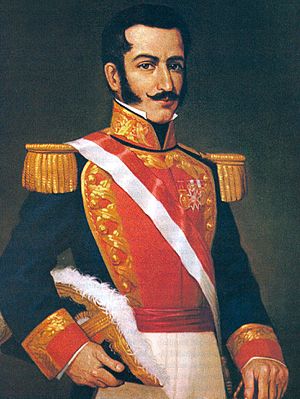Felipe Santiago Salaverry facts for kids
Quick facts for kids
Felipe Santiago Salaverry
|
|
|---|---|
 |
|
| Supreme Chief of the Peruvian Republic | |
| In office 25 February 1835 – 7 February 1836 |
|
| Preceded by | Luis José de Orbegoso as President of Peru |
| Succeeded by | Andrés de Santa Cruz as President of the Confederation |
| Personal details | |
| Born | May 3, 1806 Lima, Peru |
| Died | February 18, 1836 (aged 29) Arequipa, Perú |
| Spouse | Juana Pérez Palza de Infantas |
| Children | Carlos Augusto Salaverry Ramírez Felipe Augusto Salaverry Pérez |
Felipe Santiago de Salaverry was a Peruvian soldier and politician. He was born in Lima, Peru, in 1805 and passed away in Arequipa, Peru, on February 19, 1836. He became the Supreme Chief of Peru, a very important leadership role.
Contents
Early Life and Military Career
Felipe Salaverry studied at the College of San Carlos in Lima. When General José de San Martín arrived in Peru in 1820, Salaverry was eager to join the fight for independence. He left college and volunteered to join San Martín's forces.
Salaverry became a cadet in the Numancia battalion. He fought bravely against the Spanish army. He even led the Peruvian Cavalry in important battles like Junin and Ayacucho. These battles helped Peru gain its independence from Spain. After Peru became a republic, Salaverry quickly moved up in the army. By the age of 28, he was a General Inspector of the Peruvian Army.
Becoming Supreme Chief
In January 1835, a group of soldiers in Callao rebelled against the president, Luis José de Orbegoso. Salaverry helped defeat these rebels. Because of his success, President Orbegoso made him governor of the Callao fortress.
However, on February 23, Salaverry himself led a rebellion against the government. President Orbegoso left Lima, and Salaverry took control of the capital city. On February 25, he declared himself "Supreme Chief of the Republic." In just a few months, he gained control of southern Peru.
Key Decisions and Conflicts
During his time as Supreme Chief, Felipe Santiago Salaverry made some important decisions. One of his decrees allowed the import of enslaved people from other Latin American countries again. This changed a previous rule that said any enslaved person entering Peru would become free.
President Orbegoso sought help from Andrés Santa Cruz, the leader of Bolivia. They made an agreement that gave Santa Cruz control over a part of Peru. Soon after, the Bolivian army invaded Peru. Salaverry and his forces moved to the city of Arequipa.
Final Battles and Legacy
Salaverry won a victory at the Battle of Uchumayo on February 4, 1836. However, just three days later, on February 7, his forces were completely defeated in Socabaya, near Arequipa.
After the defeat, Salaverry tried to reach the Peruvian Navy on the coast. But he was captured by General Miller, who handed him over to Santa Cruz. Santa Cruz then ordered the execution of Salaverry and his top generals. Salaverry's field jacket, which he wore when he was executed, is now displayed at the Peruvian Museum of Gold in Monterrico.
See also
 In Spanish: Felipe Salaverry para niños
In Spanish: Felipe Salaverry para niños
Images for kids


